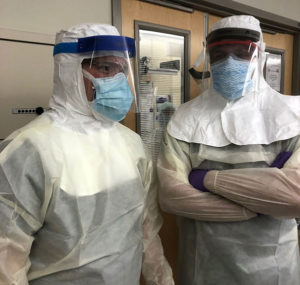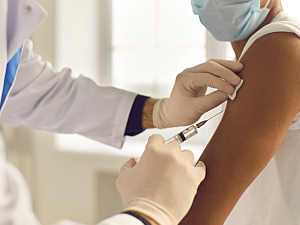 Dr. Matthew Rochefort and Dr. Anthony Coppolino prepared to perform a bedside percutaneous tracheostomy in a COVID+ patient.
Dr. Matthew Rochefort and Dr. Anthony Coppolino prepared to perform a bedside percutaneous tracheostomy in a COVID+ patient.
How does one determine when to employ tracheotomy in COVID-19 patients requiring prolonged mechanical ventilation? It’s difficult to say given what relatively little we know about the disease at this point. Stephanie L. Nitzschke, MD, an acute care surgeon, trauma surgeon and surgical intensivist, is one of the clinicians developing guidelines on tracheotomy timing at Brigham and Women’s Hospital.
Dr. Nitzschke said that in order to balance the safety of patients and health care workers, the Brigham is delaying consideration of tracheotomy until 21 days after a positive test for COVID-19. But she stressed that all protocols related to this disease are subject to change. Read More

 Dr. Matthew Rochefort and Dr. Anthony Coppolino prepared to perform a bedside percutaneous tracheostomy in a COVID+ patient.
Dr. Matthew Rochefort and Dr. Anthony Coppolino prepared to perform a bedside percutaneous tracheostomy in a COVID+ patient.